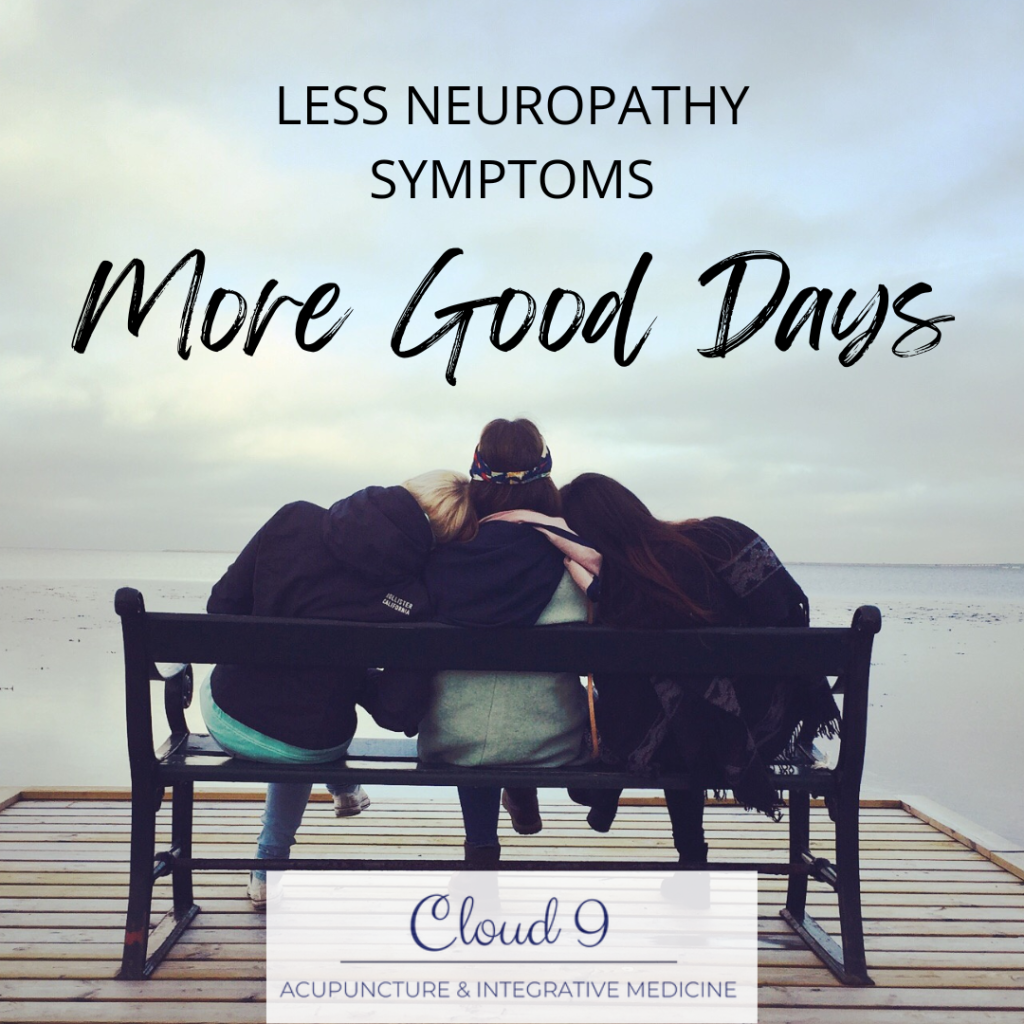- Cloud 9 Acupuncture & Integrative Medicine22 West Padonia Rd. Suite A-203
Timonium, MD 21093 Follow Us!
Neuropathy
Finding Relief: Acupuncture for Neuropathy in Baltimore County
Neuropathy, a condition characterized by nerve damage, can cause a variety of unpleasant symptoms like pain, numbness, tingling, and weakness. While conventional medicine offers very little treatment options, some people in Baltimore County are finding relief through a more holistic approach: acupuncture.
Acupuncture: A Natural Option for Neuropathy
Studies suggest acupuncture may help with neuropathy by:
- Improving blood circulation: Increased blood flow can promote nerve healing and reduce pain.
- Modulating the nervous system: Acupuncture may help regulate nerve signals, reducing pain perception.
- Reducing inflammation: Acupuncture can trigger the release of natural anti-inflammatory substances in the body.
Benefits of Acupuncture for Neuropathy
Many people with neuropathy in Baltimore County report experiencing significant benefits from acupuncture, including:
- Reduced pain and discomfort
- Improved nerve function
- Enhanced sleep quality
- Increased sense of well-being
Next Steps
Acupuncture can be a safe and effective option for managing neuropathy. If you’re in Baltimore County and considering acupuncture, consult with our Dr. Laura Parks to discuss if it’s right for you.
Disclaimer: This blog is for informational purposes only and should not be construed as medical advice. Please consult with a qualified healthcare professional before starting any new treatment, including acupuncture.

Neuropathy Relief with Acupuncture
Neuropathy is a condition that affects the peripheral nerves, causing pain, tingling, and numbness in the affected areas. While there are several treatment options available, acupuncture has gained popularity as a natural and effective method to alleviate neuropathic symptoms.
When it comes to neuropathy, acupuncture targets the affected nerves, promoting blood circulation and reducing inflammation. This stimulation triggers the release of endorphins, the body’s natural painkillers, providing relief from neuropathic pain.
Studies have shown that acupuncture can significantly reduce neuropathy symptoms and improve nerve function. It is a safe and non-invasive treatment option that can be used alongside conventional therapies.
In conclusion, acupuncture offers a promising alternative for individuals suffering from neuropathy. Its ability to address the root cause of the condition and provide relief makes it an attractive choice for many. Consider exploring this ancient therapy to manage your neuropathy symptoms effectively.

Acupuncture for Neuropathy: A Natural Approach to Pain Relief
What is Neuropathy?
Neuropathy is a condition that damages the nerves. It can cause a variety of symptoms, including pain, numbness, tingling, and weakness. Neuropathy can be caused by a number of things, including diabetes, chemotherapy, alcohol abuse, and certain medications.
How Can Acupuncture Help with Neuropathy?
Acupuncture is a traditional Chinese medicine treatment that involves inserting thin needles into specific points on the body. It is believed that acupuncture stimulates the body’s natural healing process and can help to relieve pain and inflammation.
A growing body of research suggests that acupuncture may be an effective treatment for neuropathy. One study found that acupuncture was more effective than sham acupuncture at reducing pain and improving nerve function in people with diabetic neuropathy. Another study found that acupuncture was effective at reducing pain and improving quality of life in people with chemotherapy-induced peripheral neuropathy.
How Does Acupuncture Work for Neuropathy?
Acupuncture is thought to work for neuropathy in a number of ways. It may help to:
- Reduce pain and inflammation
- Improve nerve function
- Promote blood flow to the nerves
- Stimulate the release of endorphins, the body’s natural pain relievers
What to Expect During an Acupuncture Treatment
During an acupuncture treatment, you will lie on a comfortable table. The acupuncturist will then insert thin needles into specific points on your body. The needles are usually inserted very shallowly and should not cause much pain.
Once the needles are in place, you will relax for 20-30 minutes. The acupuncturist may gently manipulate the needles during this time. After the treatment, the needles will be removed.
How Many Acupuncture Treatments Do I Need?
The number of acupuncture treatments you need will vary depending on the severity of your neuropathy and your individual response to treatment. Most people start with 2-3 treatments per week and then reduce the frequency of treatments as their symptoms improve.
If you are considering acupuncture for neuropathy, be sure to start with a consultation.
Additional Tips for Managing Neuropathy
In addition to acupuncture, there are a number of other things you can do to manage neuropathy symptoms, such as:
- Maintain a healthy weight. Excess weight can put additional pressure on the nerves.
- Exercise regularly. Exercise can help to improve nerve function and blood flow.
- Eat a healthy diet. Eating a balanced diet can help to provide the nutrients your nerves need to function properly.
- Avoid smoking and excessive alcohol consumption. Smoking and excessive alcohol consumption can damage the nerves.
- Manage any underlying medical conditions. If your neuropathy is caused by an underlying medical condition, such as diabetes, it is important to manage that condition carefully.
Acupuncture is a safe and effective treatment for neuropathy. It can help to reduce pain, improve nerve function, and promote blood flow to the nerves. If you are considering acupuncture for neuropathy, be sure to begin with a consult.

Can Acupuncture Help with Peripheral Neuropathy?
Peripheral neuropathy is a condition that affects the nerves in the hands, feet, arms, and legs. It can cause a variety of symptoms, including numbness, tingling, pain, and weakness. There is no cure for peripheral neuropathy, but there are treatments that can help to relieve symptoms.
Acupuncture is a traditional Chinese medicine treatment that involves inserting thin needles into specific points on the body. It is thought to work by stimulating the body’s natural healing abilities.
There is some evidence that acupuncture can be effective in relieving the symptoms of peripheral neuropathy. A study published in the journal Pain Medicine found that acupuncture was effective in reducing pain and improving function in people with diabetic peripheral neuropathy.
Another study, published in the journal Neurology, found that acupuncture was effective in reducing pain and improving sleep quality in people with HIV-associated peripheral neuropathy.
If you are considering acupuncture for peripheral neuropathy, it is important to talk to your doctor first. Acupuncture is not a cure for peripheral neuropathy, but it may be able to help to relieve your symptoms.
How Does Acupuncture Work for Peripheral Neuropathy?
The exact mechanism by which acupuncture works for peripheral neuropathy is not fully understood. However, it is thought that acupuncture may help to reduce inflammation, improve blood flow, and stimulate the release of pain-relieving chemicals in the body.
Acupuncture is also thought to help to improve the function of the nervous system. This may be due to the fact that acupuncture can help to restore the balance of yin and yang, which are two opposing forces that are thought to govern the body in traditional Chinese medicine.
Is Acupuncture Safe for Peripheral Neuropathy?
Acupuncture is generally considered to be a safe treatment for peripheral neuropathy. However, there are some risks associated with acupuncture, such as bleeding, bruising, and infection. It is important to see a qualified acupuncturist who is experienced in treating peripheral neuropathy.
If you are considering acupuncture for peripheral neuropathy, here are some things to keep in mind:
- Make sure to see a qualified acupuncturist who is experienced in treating peripheral neuropathy.
- Be aware of the risks associated with acupuncture.
- Be patient. It may take several treatments before you see improvement in your symptoms.
If you are looking for a natural way to relieve the symptoms of peripheral neuropathy, acupuncture may be a good option for you. Call today to begin with a consultation to find out if you’re a good candidate for treatment.

Acupuncture for Diabetic Peripheral Neuropathy: How It Can Help
Diabetic peripheral neuropathy is a common complication of diabetes that affects the nerves in the hands and feet. It can cause a variety of symptoms, including numbness, tingling, pain, and weakness.
Acupuncture is a traditional Chinese medicine treatment that has been shown to be effective in relieving the symptoms of diabetic peripheral neuropathy. It works by stimulating specific points on the body with needles. This helps to improve blood flow to the nerves and reduce inflammation.
A study published in the Journal of Clinical Endocrinology and Metabolism found that acupuncture was effective in reducing pain and improving function in people with diabetic peripheral neuropathy. The study participants received 20 acupuncture treatments over a period of 10 weeks.
Another study, published in the journal Diabetes Care, found that acupuncture was effective in improving nerve conduction velocity in people with diabetic peripheral neuropathy. Nerve conduction velocity is a measure of how quickly electrical signals travel along the nerves.
If you are living with diabetic peripheral neuropathy, acupuncture may be a helpful treatment option for you. Talk to your doctor to see if acupuncture is right for you.
Here are some of the benefits of using acupuncture for diabetic peripheral neuropathy:
- It can help to reduce pain and improve function.
- It can help to improve nerve conduction velocity.
- It can help to reduce inflammation.
- It is a safe and natural treatment.
- It has few side effects.
If you are considering acupuncture for diabetic peripheral neuropathy, call today to set up a consultation to see if you are a good candidate for treatment.
